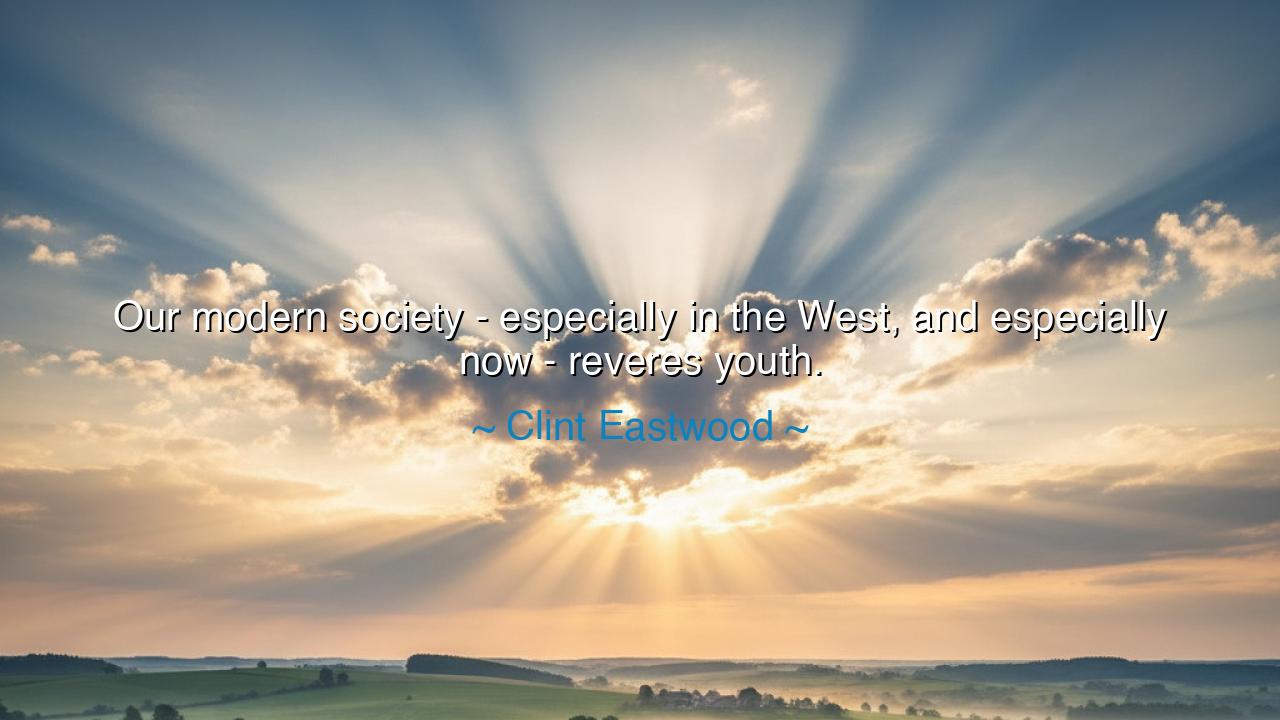
Our modern society - especially in the West, and especially now -






Listen well, O children, for I bring you the words of Clint Eastwood, a man whose life has been shaped by the passing of time, by the strength of experience, and by the wisdom that comes with age. He said, "Our modern society – especially in the West, and especially now – reveres youth." These words are not just a statement about the world we live in, but a reflection on the values we hold dear, the things we worship, and the way we measure worth. Eastwood speaks of a truth that is at the heart of modern society: that youth, with all its vigor and potential, is often seen as the pinnacle of human existence. And yet, in this reverence, we risk losing sight of something much deeper—the wisdom, the strength, and the grace that only time can provide.
What, O children, does it mean to say that we revere youth? In our world, especially in the West, we often place youth upon a pedestal, idealizing its energy, its beauty, and its promise. We live in a culture that values appearance, newness, and the boundless possibilities of those who are just beginning their journey. The young are seen as the future, as the ones who will shape the world, while the old are sometimes relegated to the shadows, their experience ignored, their stories untold. But this obsession with youth—this constant glorification of the new and the untested—overlooks the truth that age, with all its trials and tribulations, brings something equally precious: wisdom.
Consider, O children, the stories of the great elders of history, whose wisdom shaped the very foundations of civilization. In the ancient Greek world, it was the elders—those who had lived long lives and seen the rise and fall of empires—who were revered for their understanding of the human condition. Socrates, though an old man when he taught, was revered for his ability to see beyond the surface, to ask the questions that challenged the very soul of society. His wisdom was not born of youthful energy, but of a life lived through the trials of age. The great philosophers and leaders of the past did not gain their greatness through youth alone, but through the passage of time, through their experiences, and through their ability to learn from the world.
In more recent times, O children, we can look to figures like Nelson Mandela, whose leadership and wisdom were shaped over many years of struggle and suffering. Though he spent much of his youth fighting for justice, it was in his older age that he became the symbol of reconciliation and peace for the people of South Africa. Mandela’s journey teaches us that youth alone does not bring greatness—it is the strength of character, the understanding of the world gained over time, and the compassion built through years of hardship that shape true leaders. He shows us that the older generation, far from being forgotten, is often the source of the guidance and stability needed to move a society forward.
And yet, O children, in our modern world, we often overlook these truths. We live in a time where youth is not just admired, but idolized, while those who have lived long lives are often seen as outdated, their contributions dismissed. We see it in the media, in advertising, in politics, where the image of the young, the new, and the beautiful is constantly thrust before our eyes. But this obsession with youth can be dangerous, for it blinds us to the rich resources of experience and understanding that come with age. To revere youth is not wrong in itself, but when it comes at the expense of respecting the wisdom of age, we do a great disservice to ourselves and to society.
The lesson, O children, is clear: youth is a powerful force, full of potential and possibility, but it is only one part of the human experience. It is through the passage of time that we gain the wisdom to guide our actions, to understand the complexities of the world, and to build lives that are rich in meaning and depth. In our admiration of youth, we must not forget the value of age—of those who have walked the path before us and who can offer insights that no young person, no matter how brilliant, can yet possess. Experience is a teacher like no other, and those who have lived through trials, triumphs, and the changing tides of life carry a knowledge that is invaluable.
Therefore, O children, I urge you: honor the wisdom of age. Do not rush to discard the lessons of those who have lived longer lives, for in their stories lie the keys to understanding the world. While youth may offer energy and promise, it is the elder who often carries the light of experience, lighting the way forward. Let us build a society that not only values youth but also reveres age, understanding that the two—youth and age—must work together to create a world of balance, wisdom, and progress. Only in this way can we ensure that youth is nurtured by the wisdom of the past and the foundation of those who have come before. Let us honor both, for each brings something essential to the table of human life.






AAdministratorAdministrator
Welcome, honored guests. Please leave a comment, we will respond soon